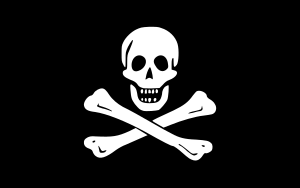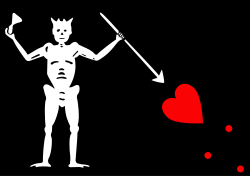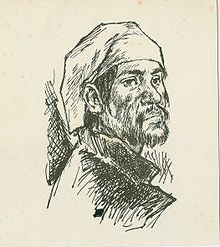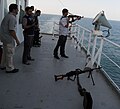Portal:Piracy
Introduction

Piracy is an act of robbery or criminal violence by ship or boat-borne attackers upon another ship or a coastal area, typically with the goal of stealing cargo and other valuable goods. Those who conduct acts of piracy are called pirates, and vessels used for piracy are called pirate ships. The earliest documented instances of piracy were in the 14th century BC, when the Sea Peoples, a group of ocean raiders, attacked the ships of the Aegean and Mediterranean civilisations. Narrow channels which funnel shipping into predictable routes have long created opportunities for piracy, as well as for privateering and commerce raiding.
Historic examples of such areas include the waters of Gibraltar, the Strait of Malacca, Madagascar, the Gulf of Aden, and the English Channel, whose geographic structures facilitated pirate attacks. The term piracy generally refers to maritime piracy, although the term has been generalized to refer to acts committed on land, in the air, on computer networks, and (in science fiction) outer space. Piracy usually excludes crimes committed by the perpetrator on their own vessel (e.g. theft), as well as privateering, which implies authorization by a state government.
Piracy or pirating is the name of a specific crime under customary international law and also the name of a number of crimes under the municipal law of a number of states. In the 21st century, seaborne piracy against transport vessels remains a significant issue, with estimated worldwide losses of US$25 billion in 2023, increased from US$16 billion in 2004. (Full article...)
Selected biography -
D. Miguel Enríquez (c. 1674–1743), was a privateer from San Juan, Puerto Rico who operated during the early 18th century. A mulato born out of wedlock, he was a shoemaker by occupation during his youth. After working for the governor as a salesman Enríquez was recruited to defend Puerto Rico, then a colony of the Spanish Empire. He commanded a couple of guarda costas, receiving a letter of marque and reprisal from the Spanish Crown for his performance. Operating during the height of the Golden Age of Piracy, Enríquez's fleet was also credited with controlling the proliferation of buccaneers in the region. However, he was considered a pirate himself by the merchants of other nations, since it was common practice of the government to ignore when foreign ships were attacked. Employing a systematic approach, Enríquez was able to become the most successful and influential Puerto Rican of his time and one of the most powerful men in the New World, converting San Juan into one of the best supplied and important ports in the Caribbean.
During his years as a privateer, Enríquez established close links with the Spanish Monarchy. In the Caribbean he rallied the support of the Catholic Church, the Spanish bureaucrats and the foreign governors of St. Thomas and Curaçao. Among other tactics, he used his ships for the distribution of urgent messages that arrived at San Juan or La Aguada to the rest of the Antilles. When there was a shortage of royal vessels, Enríquez's fleet was responsible for transporting items on behalf of Spain without charge. For this, the Crown granted him a Royal Auxiliary Identification Document (Spanish: Real Cédula Auxiliar), which allowed him to directly seek help from the Council of the Indies regardless of how insignificant a conflict was. His ships also provided transportation for the authorities that arrived at Puerto Rico en route to other locations and for Catholic missionaries. Throughout the War of the Spanish Succession, Enríquez's fleet was responsible for guarding the Spanish West Indies from incursions by the British and Dutch. In 1717, Enríquez led an operation that expelled foreign settlers from Vieques, for which he was commended. His fleet also participated in other military expeditions in 1728 and 1729. (Full article...)
Selected article -
Piracy on Falcon Lake refers to an increase in crime at the border between the United States and Mexico on Falcon Lake. The lake is a 60-mile (97 km) long reservoir of the Rio Grande that was constructed in 1954 and is a known drug smuggling route.
A turf war between rival drug cartels for control of the lake began in March 2010 and has led to a series of armed robberies and shooting incidents. All of the attacks were credited to the Los Zetas cartel and occurred primarily on the Mexican side of the reservoir but within sight of the Texas coast. The so-called pirates operate "fleets" of small boats designed to seize fishermen and smuggle drugs. (Full article...)
Did you know?
- ... that Saudi Arabian broadcaster beoutQ pirated and resold beIN Sports programmes during the Qatar diplomatic crisis?
- ... that since 1904 the Gasparilla Pirate Festival in Tampa, Florida, has featured a pirate-themed parade?
- ... that HMS Redpole, one of the aptly-named coffin brigs, sank in an action with a pirate vessel in August 1828?
- ... that the developers of Hotline Miami 2: Wrong Number suggested that Australian customers pirate their game?
- ... that Black Sheep Radio dedicated its first day of programming to a fallen pirate?
- ... that indigenous Australian artist Daniel Boyd has depicted colonial figures including Captain James Cook and Governor Arthur Phillip as pirates?
- ... that in 2011, pirates were reported as raiding along the Danube River in the center of Europe?
- ... that, unlike traditional Western societies of the time, many pirate clans operated as limited democracies, demanding the right to elect and replace their leaders?
- ... that red Jolly Roger flags were the most feared of all; all prayed they never encountered the "Bloody Red," which boldly declared that no mercy would be shown and all victims would be killed?
Selected quotations
| “ | Coming up to them, there has passed some common shot between some of our fleet and some of them; and as far as we perceive, they are determined to sell their lives with blows. | ” |
| — Francis Drake to Admiral Henry Seymour, after coming upon part of the Spanish Armada. | ||
General images
Selected Jolly Roger

Subcategories
Topics
WikiProjects
Related portals
Things you can do

Contribute
- Work on piracy and pirate articles and help improve them to featured articles.
Expand
Join
WikiProject Piracy Requests
- eliminate red links from List of pirates
- expand Timeline of piracy, specifically to fill in vast gap between the 1890s to 2000s
- revise Bartholomew Roberts
- help with Requested articles and Expand articles
- help with Portal:Piracy
Associated Wikimedia
The following Wikimedia Foundation sister projects provide more on this subject:
-
Commons
Free media repository -
Wikibooks
Free textbooks and manuals -
Wikidata
Free knowledge base -
Wikinews
Free-content news -
Wikiquote
Collection of quotations -
Wikisource
Free-content library -
Wikiversity
Free learning tools -
Wiktionary
Dictionary and thesaurus











































































































